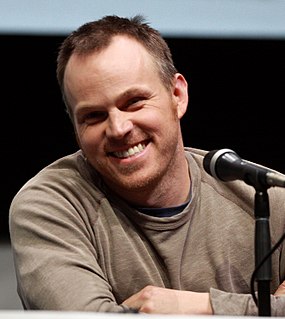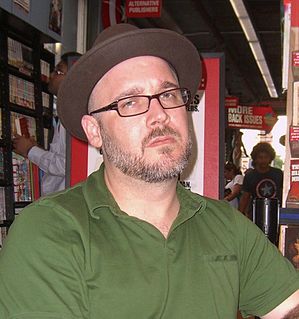A Quote by Daniel Clowes
My feeling is that it's one of the very few things that comics can do that you really can't do in any other medium. I feel like the reader accepts all of these styles, and after a certain point you can flip the pages and see a character rendered very differently than you saw on an earlier page, and it's not jarring. It suggests things that you can't suggest just in the writing or in the plotting.
Related Quotes
I never feel there's anything I can't do with comics. There are certain things in comics that you can't do in any other medium: for instance, in Mister Wonderful, Marshall's narration overlaps the events as they're going on. That would be difficult in film; you could blot speech out with a voiceover, but it wouldn't have the same effect. That's always of interest, to see what new things you can do in comics form.
Writing screenplays is very freeing from what you can do in comics in a lot of ways. You can change things around. I can take great delight in writing 40 pages, then just pressing delete and getting rid of it and not thinking about it ever again. Whereas in comics, if I had put that kind of effort into it, I couldn't go on.
Surely comics require more effort on the part of the reader than movies or television. I'm always learning new things you can do with comics that wouldn't work in any other medium, and often they require the need to process a lot of dense information. Of course, the trick is to make the complicated seem effortless and spontaneous.
I was a voracious reader and I could never understand why comics were of any less merit or importance than any other way of writing. I think the thing that keeps me with comics is there's still so much to be done. There's still this huge unplowed field, this huge unexplored wilderness, and as long as I can keep doing new things and coming up with new things, I will.
I saw the comics in the East Village Other, and they weren't superhero comics, they were all about hippies and all about things hippies were interested in. And there was one page in particular, a full page strip called "Gentle's Trip Out" signed "Panzika", and it was totally, totally psychedelic, and really, I don't know if it made any sense at all but it looked so great, and I thought, "This is what I want to do, this is my big influence," and it was.
I think it's really important, when you're redefining a character [ Spider-Man], for the audience to experience things that they haven't experienced, from the ground up. I wanted to build a character. I feel like point of view is a really crucial thing in the story, and that you need to build up the emotional building blocks, so that you can experience all the other emotions in a very specific way, rather than just experiencing it in an intellectual way.
Ever since high school I've been writing in a spiral notebook, in pencil. Everything looks too polished on a computer when you start writing, and I can't really see it. I feel like the words are much more naked in pencil, on a notebook. I feel that my brain works differently, and words come out differently, if I have a pencil in my hand, rather than if I have a keyboard. I tend to add more in the margins. I tend to elongate the sentences as I'm writing and editing, and there is just something about the feeling of writing longhand that I really love.
With comics, you can only really learn what you're doing wrong or what works best when you see your work published. I've been publishing comics since my 20s, and still, when I flip through any of my new comics, I still only see the things that I wish I'd done better. But that's how you learn, by seeing it.
Words in prose ought to express the intended meaning; if they attract attention to themselves, it is a fault; in the very best styles you read page after page without noticing the medium. Works of imagination should be written in very plain language; the more purely imaginative they are, the more necessary it is to be plain.
When I am writing I don't set a certain number of pages. I do know that the further into a script I get the faster it goes. As soon as you start making decisions you start cutting off all of the other possibilities of things that could happen. So with every decision that you make you are removing a whole bunch of other possibilities of where that story can go or what that character can do. So when I get maybe 2/3's of the way through I can see very clearly where it is going to go.
I'm more intrigued by things that I haven't really conceived of yet. I have the luxury of being able to think: "I've never done a ballet or an animated film myself." There are certain things that I feel I'd love to. I just want to keep trying new things and seeing if I'm any good at them, and if I'm not, then at least learning that. I definitely think I'm more interested in what medium I can explore right now than any specific story.
You cannot overestimate the role of intuition in fiction writing. Or the role of accident or randomness. These things are very central. This is never really admitted. You have to cover the pages. You have to have those people do things. And the things they do have to be relevant to the entire concern. The specific things they do don't much matter, you just have to have them do something that counts.




































